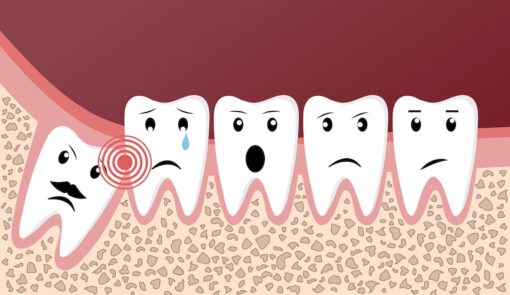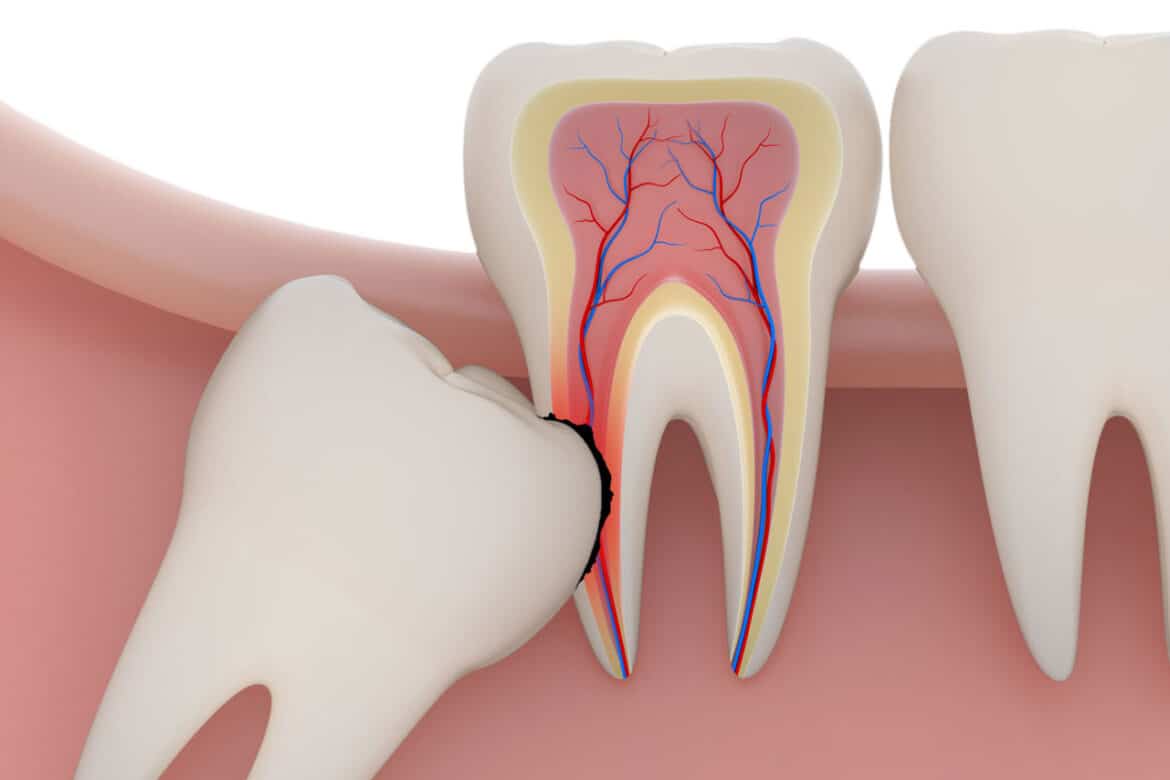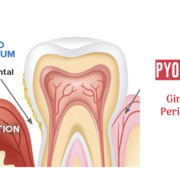Have you ever wondered when wisdom teeth stop growing? They are also known as third molars, are the last of the adult teeth to emerge. It’s a common belief that last teeth stop growing at age 25, but is this true? While there is no single definitive answer, it is possible to provide some guidance on the subject. Studies have found that age 25 is a good cutoff for when wisdom teeth stop growing, with most people’s wisdom teeth growing by their mid-twenties. However, it’s important to note that this can vary from person to person, and some people’s third molar teeth may continue to grow even after reaching 25. Visit your dentist!
Factors like genetics, diet, and lifestyle can all play a role in the growth of third molar teeth, so it’s important to be aware of the signs and symptoms of its coming in. In this article, we’ll explore the concept of last teeth growth at age 25 and provide some tips to help you recognize when your last teeth may be emerging.
What are Wisdom Teeth?
Wisdom teeth, also known as third molars, are the last set of permanent teeth to erupt. They are the last of the adult teeth to emerge and are also known as third molars. They usually emerge between the ages of 17 and 25, and can cause a variety of dental issues if not properly cared for or if they grow in at an angle. Most people have four last molar teeth, two in the upper jaw and two in the lower jaw. It’s important to note that some people may not have any last teeth at all, or may have fewer than four.

Does Wisdom Teeth Stop Growing at 25?
Most people have probably heard the old wives’ tale that wisdom teeth stop growing when you’re 25. While there is no single definitive answer as to when third molar teeth stop growing, studies have found that age 25 is a good cutoff. Most people’s wisdom teeth grow by their mid-twenties. But this doesn’t mean that the last teeth won’t continue to grow after the age of 25 in some individuals.
The most common signs and symptoms of last teeth growth include pain or tenderness in the gums, swelling in the gums, difficulty opening the mouth, and jaw stiffness. You may also notice that your wisdom teeth are pushing other teeth out of alignment. If you experience any of these symptoms, it’s important to visit your dentist for an evaluation.
Factors Influencing Wisdom Teeth Growth
Genetics: The size and shape of a person’s jaw are largely determined by genetics, and this can influence the development of wisdom teeth. If a person’s jaw is too small to accommodate the growth of third molar teeth, they may become impacted or cause crowding and other dental problems.
Age: Wisdom teeth typically begin to develop in the late teenage years or early adulthood, and their growth can be influenced by a person’s age. Younger people tend to have more active and growing bone, which can make the extraction of wisdom teeth more difficult.
Gender: Women tend to have smaller jaw sizes than men, which can make it more likely for wisdom teeth to become impacted or cause other dental problems.

Diet: A diet that is high in soft or processed foods may not provide the necessary chewing resistance to stimulate the proper growth and positioning of wisdom teeth. Conversely, a diet that is too hard or chewy can cause problems with the teeth or cause undue stress on the jaw.
Tooth Development: The development and growth of surrounding teeth can influence the growth and positioning of last teeth. If other teeth are missing, or if there is crowding or other dental issues, the growth of wisdom teeth may be impacted.
Oral Health: Good oral hygiene can play a significant role in the growth and positioning of wisdom teeth. Poor oral hygiene can lead to tooth decay and gum disease, which can cause issues with the growth and positioning of molar teeth.
When Do Wisdom Teeth Stop Growing
Wisdom teeth, also known as third molars, typically stop growing between the ages of 17 and 25. This is because by this time, all of the adult teeth have erupted, and the jawbone has stopped growing. However, in some cases, wisdom teeth may continue to grow into the early 30s or even later.
There are a few reasons why wisdom teeth may continue to grow after the age of 25. One possibility is that the jawbone continues to grow, which can create more space for the wisdom teeth to erupt. Another possibility is that the wisdom teeth are impacted, meaning that they are blocked from erupting properly by other teeth or bones. If wisdom teeth continue to grow after the age of 25, they can cause a number of problems, including:
- Pain and discomfort
- Damage to adjacent teeth
- Infection
- Cysts
- Bone loss
Tips for Recognising Wisdom Teeth Growth
If you’re concerned about your third molar teeth growing in, there are several things you can do to recognise the signs and symptoms of its growth. Firstly, pay close attention to any changes in your mouth. If you notice any pain or tenderness in your gums, swelling, or difficulty opening your mouth, it may be a sign that your wisdom teeth are emerging. Secondly, keep an eye on your other teeth. If your molar teeth are pushing your other teeth out of alignment, you may need to visit your dentist for an evaluation.

Molar teeth can stop growing at any age, and there is no set age at which they will stop. However, it is true that many people’s wisdom teeth stop growing by their mid-20s or early 30s. This is because the jawbone tends to stop growing at this age, and once the jawbone stops growing, there may not be enough space for the wisdom teeth to emerge properly. In some cases, the wisdom teeth may remain impacted (trapped beneath the gum line) or grow in at an angle, which can cause pain, infection, and other dental problems.
How to Prevent Wisdom Teeth Pain?
There are several steps you can take to reduce the pain and discomfort associated with growing their wisdom. Firstly, make sure to brush and floss your teeth regularly. This will help to keep your gums healthy and reduce the risk of infection. Additionally, it’s important to maintain a balanced diet with plenty of calcium and vitamin D to ensure that your wisdom teeth develop properly. Finally, if you’re experiencing pain, you can take over-the-counter pain medications or use a warm saltwater rinse to help soothe the area.
Treatment Options for Wisdom Teeth
If your wisdom teeth are causing pain or other dental issues, it’s important to seek treatment. Your dentist may recommend removing your third molar teeth to prevent the teeth from pushing other teeth out of alignment. Other treatment options may include braces or other orthodontic treatments to help align the teeth. Additionally, your dentist may suggest using a mouthguard or other appliances to help keep your mouth in proper alignment.
Wisdom Tooth Extraction
If wisdom teeth are causing problems, your dentist will recommend extraction. Wisdom tooth extraction is a common procedure, and it is typically performed under local anesthesia. In some cases, general anesthesia may be used.
Wisdom Tooth Monitoring
If your wisdom teeth are not causing any problems, your dentist may recommend monitoring them to see if they develop any problems in the future. This will involve regular dental checkups and X-rays to track the wisdom teeth and ensure they are not causing any damage to your other teeth.
Wisdom Tooth Surgery
If your wisdom teeth are impacted, meaning they are trapped in the jawbone, your dentist will need to perform surgery to remove them. This is a more complex procedure than regular wisdom tooth extraction, but it is still a safe and effective treatment.
At Royal Dental Clinics, we understand that wisdom tooth removal can be a daunting experience. That’s why we are committed to providing our patients with the highest quality care in a compassionate and comfortable environment. Our team of experienced oral surgeons is equipped with the latest techniques and technologies to ensure a safe and successful procedure.
If you are experiencing any problems with your wisdom teeth, don’t hesitate to contact Royal Dental Clinics today. We offer convenient appointments and will work with you to find a treatment plan that fits your needs and budget.
Conclusion
While age 25 is a good cutoff for when most people’s molar teeth stop growing, it’s important to be aware that this can vary from person to person. Factors like genetics, diet, and lifestyle can all play a role in the growth of last teeth, so it’s important to recognize the signs and symptoms of wisdom teeth coming in. Additionally, it’s important to seek treatment if your wisdom teeth are causing pain or other dental issues. By following these tips, you can help ensure that your molar teeth grow properly and avoid any potential dental problems.
© All rights reserved by Royal Dental Implants Pvt Ltd
Issued in public interest






